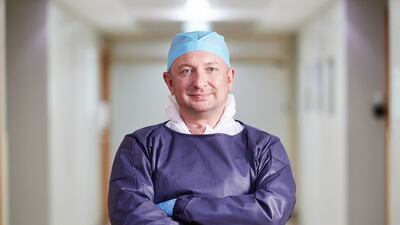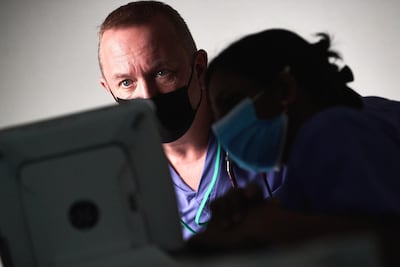A UAE medical chief has been hailed a healthcare hero after overcoming a “terrifying” battle with the coronavirus to lead his hospital’s successful fight against the virus.
Dr David Simon, 48, head of intensive care at Mediclinic Al Ain Hospital, was treating a growing number of Covid-19 patients when he was struck down by the disease in May.
The critical care consultant, who has worked in the field of infectious disease for more than 25 years, said there was no way for health services to prepare for the mammoth challenge.
Dr Simon’s sterling efforts have been recognised by the Frontline Heroes Office, set up to shine a light on the achievements of those working to defeat the virus.
“This was something brand new and completely unprecedented,” said Dr Simon, who is from Hungary.
“When Covid-19 swept across the world in early 2020, it was a biological catastrophe.
“In the medical profession, we could only react to the virus as it happened. We didn’t have a specific drug or approach; we didn’t have a ventilation strategy or other necessary procedures.”
Dr Simon worked quickly to ensure the hospital could meet the increasing demands of the outbreak.
In April, he extended its intensive care unit, adding 12 beds and dedicating almost of all of his staff to Covid-19 patient care.
“We were working around the clock and it was a case of all hands on deck to help these patients who were desperately ill,” he said.
Healthcare workers lead fight against Covid-19:
“We were able to accurately assess the patient flow, but there was no such thing as a typical patient. They were all ages and nationalities and the virus affected everyone differently.
“I would see senior women in their nineties pass through easily while some younger men in their thirties were close to death. There was one man on a ventilator for three months with a tracheostomy who luckily survived.
“I was exhausted, but the experience of helping patients and seeing the success stories, bringing patients off the ventilator, pulling out the tube and sending them home kept me going.”
In May, Dr Simon was taken out of the front line after catching the virus and had to adapt to life as a patient.
“It was a typical picture of Covid-19: I had opacity on my lungs, meaning that the virus had begun destroying a part of my lung tissue, and I was feverish and exhausted,” he said.
“Honestly, I was terrified because it progressed so quickly. The weakness I felt was unlike anything I had ever experienced. I couldn’t even move two metres to the bathroom. But I still sat up in bed and took part in conference calls when I felt stronger.
“I didn’t see my teenage children or my wife, who is an anaesthetist. They would only call me on the phone. It was claustrophobic being in that small space and I felt cut off from everyone. It was a strange time for me, being the patient.”
Dr Simon made a full recovery and after a fortnight of home quarantine he returned to work.
He said contracting the virus made him more empathetic in his job.
“When I spoke to patients, I knew what they were going through,” he said.
“Recovering also helped me deal with their families emotionally, which was one of the toughest parts. Covid-19 patients were not allowed any visitors, so we were responsible for meeting the families every day to report on their loved ones.
“If a patient’s condition was worsening, that was particularly hard to do. Once I could tell them that I myself had recovered, it made things much easier.”
In June, Mediclinic Al Ain Hospital was declared Covid-19-free, capping off a roller coaster three months for the senior doctor.
“I would say the most important lesson for humanity to take from this crisis is to take responsibility for their own bodies,” he said.
“If you don’t look after your own health, then who will? Covid-19 affected my entire life both personally and professionally. I was caught right in the middle and I will never forget this period, nor do I want to.”
















